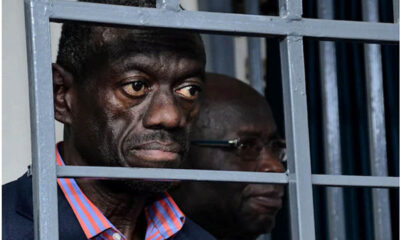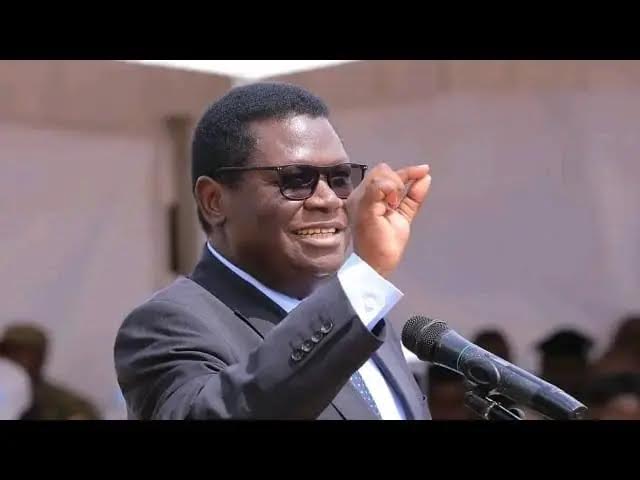
Opinion : Family Rule and National Looting: How Museveni’s Nepotism Mirrors Africa’s Despotic Legacy
our rulers become insecure in their sumptuous offices and therefore they must surround themselves with their own relatives with whom, of course, they loot the national treasury.’
In the annals of African political history, Yoweri Museveni’s leadership in Uganda appears to follow a troubling and all-too-familiar script. Journalist David Lamb’s account of President William Tolbert of Liberia and his systematic family appointments eerily parallels what is taking place in Uganda today. Just as Tolbert surrounded himself with family members in the corridors of power, so too has Museveni crafted a similar network in Uganda—an intricate web of nepotism that raises serious concerns about governance, transparency, and democracy.
The appointment of Museveni’s wife Janet as Minister of Karamoja, his son Muhoozi as the commander of Special Forces, his brother Salim Saleh as a Senior Presidential Advisor, and numerous other relatives in key state positions has created an atmosphere where political power is increasingly concentrated within the Museveni family. This mirrors the very same patrimonialism that defined the regimes of Mobutu Sese Seko in Zaire and Daniel arap Moi in Kenya—regimes where family and clan were prioritized over national interest, and where loyalty to the ruler, rather than merit, determined appointments.
While Museveni’s apologists argue that figures like Saleh and Kutesa merit their positions, the reality is that Uganda is home to countless talented individuals who are equally, if not more, capable of fulfilling these roles. The continued appointment of family members to influential positions sends a disheartening message to the Ugandan populace: that meritocracy is secondary to loyalty, and the higher echelons of power are reserved for the select few who share the president’s bloodline.
This informalization of power, as observed by Dr. Oloka Onyango and journalist Charles Onyango-Obbo, is not new in African politics. The reliance on family rule reflects Museveni’s growing insecurity and the need to surround himself with individuals he can trust implicitly. In this context, blood ties offer the ultimate form of loyalty—far more reliable, in Museveni’s view, than the allegiance of political associates or technocrats. Yet, as seen in the case of Mobutu, such nepotism eventually contributes to the erosion of state institutions, as power becomes an insular, family affair.
The larger question that arises from Museveni’s political maneuvers is this: Has Uganda truly moved forward since the days of Tolbert, Mobutu, and Moi, or has the country merely witnessed a “change in the wind” rather than the promised “wind of change”? Museveni’s entrenchment of family rule, coupled with his dismantling of national institutions, suggests that Uganda is more entrenched in the very political practices it once sought to escape. It is deeply ironic that a leader who once denounced such African dictatorships now presides over one of his own making.
Museveni’s nepotism reflects a fundamental distrust in state institutions. Like Mobutu, Museveni seems to understand that holding onto power requires not just brute force but a well-maintained network of trusted kin. As Uganda moves further into this neo-patrimonial system, the president’s original promise of “fundamental change” rings increasingly hollow. What remains is a state where power is less about serving the nation and more about perpetuating a dynastic rule.
In the end, the cost of this nepotism will not only be borne by Museveni’s successors—who will inherit a country deeply fractured by regional, ethnic, and political divisions—but also by the Ugandan people, whose dreams of a meritocratic and democratic society will be continually deferred. As Bidandi Ssali astutely observed, Museveni’s political grooming did not include learning from elders or building institutional integrity. Instead, he has entrenched a system of family rule that serves to secure his own political future at the expense of the nation.
Uganda now finds itself at a critical juncture, where the informal power wielded by the president’s kin threatens to overshadow the formal institutions of governance. As Museveni’s tenure continues, Uganda risks falling into the same trap that ensnared so many African nations before it—a trap where loyalty to the president supersedes loyalty to the country, and where the state’s resources are looted by a small clique of family members. This is the anatomy of family rule in Uganda today, a reality that raises grave concerns about the future of governance in the country.
Related
Opinion : Family Rule and National Looting: How Museveni’s Nepotism Mirrors Africa’s Despotic Legacy
News
Ugandan Citizen Abducted, Held in Secret Detention for Three Months, Sparks Outrage and Calls for Justice

A disturbing new case of unlawful detention has surfaced, highlighting the ongoing human rights crisis in Uganda. A Ugandan citizen was reportedly abducted and held in a secret facility, known as a “safe house,” for three months, only to be released without charge or explanation. This incident, reported by NTV Uganda, has sparked widespread condemnation and renewed calls for accountability regarding human rights abuses in the country.
While the details surrounding the abduction remain unclear, reports indicate that the individual was taken without due process and held incommunicado—an action that has long been condemned by human rights organizations. The victim’s release, with no charges filed and no clear justification, has angered activists and citizens, who view this as yet another case of egregious abuse of power by the state.
“This is a recurring pattern,” said one human rights activist. “Abductions, secret detentions, and unexplained releases have become all too common in Uganda. These acts violate fundamental human rights and erode public trust in the justice system.”
The use of “safe houses,” unregistered detention facilities reportedly operated by security forces, has been a focal point in numerous allegations of torture and illegal imprisonment. Despite repeated calls from both local and international organizations for their closure and accountability for those involved, little action has been taken to address these violations.
This case underscores the urgent need for reform within Uganda’s security apparatus and greater accountability for human rights abuses. Observers hope that drawing attention to these injustices will spur concrete action to bring those responsible to justice and ensure the protection of basic human rights.
As frustration mounts, calls for both domestic and international pressure to hold the government accountable for such crimes grow louder. “One day, there must be accountability for all these crimes against our people,” stated one social media user, reflecting the sentiments of many Ugandans.
News
NUP Gathering Disrupted: Kyagulanyi Alleges Security Force Harassment and Arrests

National Unity Platform (NUP) President Robert Kyagulanyi has accused Ugandan security forces of using excessive force to disrupt a planned NUP gathering. The allegations were detailed in a statement shared on Twitter, following an event held to honor children of NUP supporters who were killed, disappeared, or detained for their political beliefs.
According to Kyagulanyi, security personnel, under the command of an officer identified as Asiimwe, carried out a preemptive operation early in the morning upon learning of the NUP’s plans. The forces allegedly stormed the premises, arrested workers, and deployed tear gas to disperse those present.
“The criminals under the command of one Asiimwe deployed early morning, arrested our workers, and threw tear gas into our premises. They’ve cordoned off the premises and blocked all people from accessing the place,” Kyagulanyi wrote.
Among those reportedly arrested were Saava Peter, Mudenya Samson, and Turyasingura Samson. Kyagulanyi claimed the detained workers were subjected to beatings and interrogated about their political affiliations, with security operatives labeling them as terrorists.
“These JATT operatives asked the workers who they support politically, branding them terrorists and criminals—their only crime being that they work with us. You can imagine the indignity!” Kyagulanyi lamented.
This incident adds to the growing tension in Uganda’s political climate, where opposition parties frequently accuse the government of stifling dissent. Despite the challenges, Kyagulanyi ended his statement with a message of defiance and optimism, proclaiming, “UGANDA WILL BE FREE.”
NUP Gathering Disrupted: Kyagulanyi Alleges Security Force Harassment and Arrests
News
Sudan Demands Apology from Uganda Over Army Chief Muhoozi Kainerugaba’s Threat to Invade Khartoum

Sudan has demanded an official apology from Uganda over “offensive and dangerous” comments made by the chief of Uganda army staff, who threated to invade Khartoum, the Sudan Tribune has reported.
General Muhoozi Kainerugaba, son of Ugandan President Yoweri Museveni and CDF of the Ugandan army, posted two comments on the X platform on Tuesday in which he threatened “to capture Khartoum” with the support of the US President elect Donald Trump after he takes office. The posts were deleted later.
“The government of Sudan demands and official apology from the Ugandan government for the offensive and dangerous comments of the army commander,” Sudan’s foreign ministry said in a statement that the Sudan Tribune said it has seen.
Sudan Demands Apology from Uganda Over Army Chief Muhoozi Kainerugaba’s Threat to Invade Khartoum








